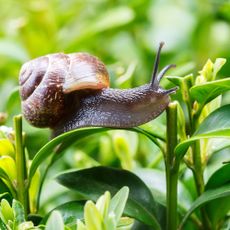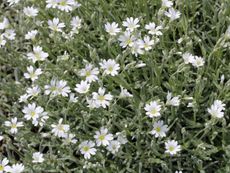Snow In Summer Plant Care – Reasons For No Flowers On Snow In Summer Plant


Snow in summer is a lovely plant with grayish green leaves and bright white flowers in June. It spreads beautifully and is useful in rock gardens where it can cascade down amongst other creeping species. A non-flowering snow in summer plant might seem a mystery, but these short-lived plants need dividing annually and well-draining soil to perform properly. If you have no flowers on your snow in summer plant, you might just need to fertilize or consider a site change to optimize the plant's lighting and soil needs.
Snow in Summer Plant isn't Blooming
Great masses of white blooms on silvery gray foliage are the hallmark of the snow in summer plant. Failure to form flowers might be related to site conditions, lack of nutrients, or simply poor snow in summer plant care. Another common cause of no flowers on snow in summer plant is planting in the incorrect zone. This is an alpine plant that thrives in USDA zones 3 to 7. Planting it in tropical to semi-tropical zones will not afford it the chilling period it needs to form blooms. Snow in summer plants form broad foliage mounds very quickly. They bloom in late spring to early summer, producing a carpet of bright white flowers quickly. The narrow leaves are evergreen, and the plant will produce a 6 inch (15 cm.) tall mat. In some climates, the flowers will self-seed if not removed from the plant. Fortunately, it takes to shearing or even a high mow to remove spent blooms and neaten the plant. When a snow in summer plant isn't blooming, you may have sheared it at the wrong time. Trim plants after blooms or when flowers are just spent to prevent removing the next season's bloom material. To keep your plant happy, install it in the optimum location. Snow in summer likes slightly sandy, well-draining soil in full sun. It prefers areas with cool summer months and does not like excessive heat. It is drought tolerant once established but will grow faster and better with average moisture. One thing that will really make the plant unhappy is compact, clay soil that doesn't drain well. This can lead to root rot and could cause a non-flowering snow in summer plant, but it is more likely to affect foliage first and can even trigger total plant death. Over time, the centers of the plant will fail to bloom, but the division of the plant in early spring or autumn will help produce more compact plants and better blooming.
Snow in Summer Plant Care
Once snow in summer is established, it is best to leave it on the dry side. Water only when the top few inches (8 cm.) of soil are dry. The plant can be an aggressive grower but shearing it after bloom will create a tighter plant and prevent it from overrunning the planting site. Clip them back to 2 inches (5 cm.) in height and the plant will rapidly produce new foliage and stems. Luckily, snow in summer plants have no serious disease or pest issues. Soil that doesn't drain well seems to be their biggest problem. Overhead watering during the warm, moist months should be discouraged, as rust can become an issue. Fertilize in spring with a balanced all-purpose, time-release granule formula. This will feed the plant for up to three months, providing it nutrition to both flower and produce foliage. If necessary, you may want to encourage more blooms by using a high phosphorus fertilizer or adding bone meal to the soil around non-flowering snow in summer plants.
Gardening tips, videos, info and more delivered right to your inbox!
Sign up for the Gardening Know How newsletter today and receive a free download of our most popular eBook "How to Grow Delicious Tomatoes."

Bonnie Grant is a professional landscaper with a Certification in Urban Gardening. She has been gardening and writing for 15 years. A former professional chef, she has a passion for edible landscaping.
-
 What Is A Nectary? Where To Find Them And Why They Matter To Wildlife
What Is A Nectary? Where To Find Them And Why They Matter To WildlifeA nectary is a vital part of many flowering plants that attracts pollinators and benefits everybody.
By Tonya Barnett
-
 7 Lush Leafy Plants Slugs And Snails Won’t Touch – For A Gorgeous Pest-Proof Garden
7 Lush Leafy Plants Slugs And Snails Won’t Touch – For A Gorgeous Pest-Proof GardenTired of slugs and snails devouring your prized plants? Discover the verdant varieties that these pests avoid, and keep your garden vibrant and damage-free.
By Bonnie L. Grant
